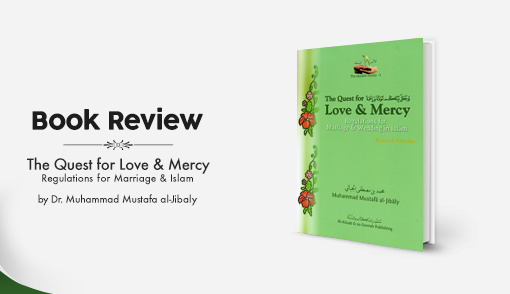
Many Malay-Muslim weddings are steeped in cultural practices passed down from generation to generation without question. With this book, we are able to examine these practices in the light of the Quran and Sunnah. Insha Allah, we can purify our sources of knowledge, understanding and, consequently, actions so that they are clean from human innovation (bid’ah).
This book, the first in ‘The Muslim Family’ series of three books, discusses all steps involved in establishing a marriage. It begins with reminding Muslims in Chapter 1 that Allah commands us to marry and to help those under our charge to marry too, a call that had been repeatedly stressed by Prophet Muhammad (Peace Be Upon Him).
The selection of a spouse is discussed in Chapter 2. A man should seek a wife who is righteous, of good character, loving and caring, and who can bring happiness. Virginity is recommended but is not a condition for marriage. Beauty, wealth and prestige are “secondary qualities that should not be sought at the cost of righteousness”. Just as importantly, “a man should seek a wife who is compatible with him”. For a woman, her potential husband should be a man of good deen and character; “wealth and social status should never be her main criteria in deciding for or against a husband”.
The other chapters deal with the courtship, marriage contract, marriage celebration, walimah (wedding feast), consummation of the marriage, and forbidden marriages. The writer helps us to realise many aspects relating to marriage, some of which are as follows:
It is bid’ah to recite Al-Fatihah in a situation when a man asks for a woman’s hand and his proposal is accepted, “because it has no basis in the Sunnah”.
It is advisable not to hold a party to announce the engagement because if “a publicised khitbah (asking for hand in marriage) is not concluded with actual marriage, serious harm may result from publicising it, especially in regard to the bride’s reputation”.
The exchange of engagement rings as well as wedding rings is “in violation of Islam… (and) has no basis in Islam. It originates from an old Christian practice that Muslims should not emulate”.
A bride’s permission is a required element of the marriage contract. She should be represented by her wali (guardian), whose presence is a condition for the validity of the marriage contract. Her wali should be her father or, if he is unable to do so, her next closest mahram.
The mahr (dowry), a mandatory marriage gift from the husband to the wife, is “the sole right of the wife and no one may take any of it without her permission – not even her parents”. The dowry should be in accordance with the husband’s financial ability.
It is important to publicise the marriage “without going into extravagance and excessiveness”. During such occasions, un-Islamic practices should be avoided, including that of screening a video of the newly-wed couple (a trend at wedding receptions these days).
It is obligatory for the husband to offer a walimah (wedding feast) to family and friends after the consummation of marriage, normally on the wedding night or within three days following it.
The other two books in ‘The Muslim Family’ series are Closer Than a Garment – Marital Intimacy According to the Pure Sunnah and The Fragile Vessels – Rights and Obligations Between the Spouses in Islam. Insha Allah, through reading these books, we will be properly guided in regard to marriage, a part of our life that “holds a position of perpetual significance because of the central role it plays in the human life”.
by Zuraidah Omar
Book Review: The Quest for Love & Mercy – Regulations for Marriage & Weddings in Islam
Published on February 18, 2021
Share this post
Excerpt
Many Muslim weddings are steeped in cultural practices passed down from generation to generation without question. With this book, we are able to examine these practices in the light of the Quran and Sunnah. Insha Allah, we can purify our sources of knowledge, understanding and, consequently, actions so that they are clean from human innovation (bid’ah).
About the author
At The Islam Shop, we don't just sell products; we craft experiences that resonate with the essence of Islamic excellence. Our mission transcends mere transactions; we aspire to be the unparalleled leaders in the online Islamic marketplace.
Our commitment is unwavering — to offer you not just a selection, but an expansive array of choices that embody the rich tapestry of Islamic culture. We don't just provide value; we redefine it, ensuring that every purchase is not just a transaction but a journey into the world of quality and significance.
We are more than a seller; we are curators of passion, dedicated to sharing our expertise with you. Our team doesn't just offer advice; we provide insights driven by a genuine passion for Islamic products. We believe that each product tells a story, and it is our mission to make sure that story resonates with you.
The Islam Shop isn't merely a platform; it's an invitation to be intrigued, excited, and inspired. We aim to ignite your curiosity and continually motivate you to embrace and celebrate Islamic products. Our commitment goes beyond selling; it's about fostering a connection, sparking an interest, and creating an enduring bond with every customer.
Step into a world where every click is a step towards enriching your life with Islamic elegance. Join us as we passionately lead the way, shaping the future of online Islamic commerce.
Welcome to The Islam Shop — where choice, value, and passion converge to redefine your Islamic shopping experience.
Elevate your expectations; embrace the extraordinary.
The Islam Shop Team








